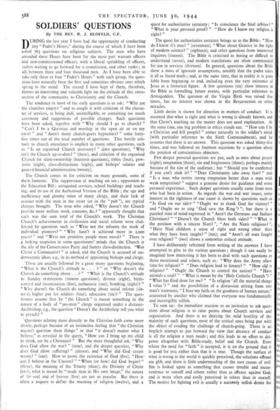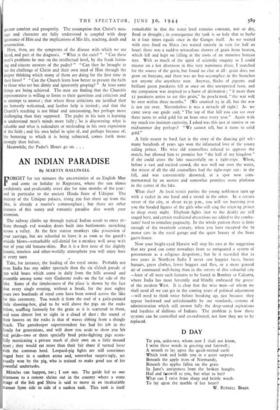SOLDIERS' QUESTIONS
By THE REV. R. J. BLOFELD, C.F.
The tendency in most of the early questions is to ask: " Why are the churches empty? " and to couple it with criticism of the charac- ter of services, as being dull, unintelligible, or containing too much ceremony and suggestions of possible changes. Such questions have been asked, together with " Why should I go to church? " " Can't I be a Christian and worship in the open air or on my own? " and " Aren't many church-goers hypocrites? " some forty- five times out of the total number of questions. This hostile atti- tude to church attendance is implicit in many other questions, such as " Is an organised Church necessary? " (two questions), " Why isn't the Church up-to-date? " (three), and criticism of the organised Church for slum-ownership (fourteen questions), tithes (four), pew- rents (eight), class-distinctions (eight), and bishops' salaries and general financial administration (twenty).
The Church comes in for criticism on many grounds, some of them fantastic. The suppression of teaching on sex ; opposition to the Education Bill ; antiquated services, school buildings and teach- ing, and its use of the Authorised Version of the Bible ; the age and inefficiency and gloomy mien of many clergy, and their lack of contact with the man in the street (or in the " pub "), are typical charges brought. The man who asked, " Why doesn't the Church provide more welfare work, canteens, &c.? " apparently thought that such was the sum total of the Church's work. The Christian Church's achievements in civilisation and social reform were chal- len,led by questions such as " Were not the reforms the work of individual pioneers? " " Why hasn't it achieved more in 2,000 years? " and " Were not primitive people more moral? " There is a lurking suspicion in some questioners' minds that the Church is the ally of the Conservative Party and fosters class-distinction. "Was Christ a Communist? " is asked, and the Church is accused of un- democratic ideas, e.g., in its method of appointing bishops and clergy.
These are usually followed by a great many questions beginning, " What is the Church's attitude to . . . ? " or " Why doesn't the Church do something about . . .? " " What is the Church's attitude to Sunday restrictions (sixteen questions), divorce (eight), birth- control and insemination (five), euthanasia (one), bombing (eight)? " " Why doesn't the Church do something about social reform (six- Teel), higher pay for soldiers (four), education (six)? " The ques- tioners assume that by " the Church " is meant something in the nature of a body of " yes-men" clergy organised under a dictator- Archbishop, e.g., the question " Doesn't the Archbishop tell you what to preach? "
Questions relating more directly to the Christian faith come more slowly, perhaps because of an instinctive feeling that " the Christian mustn't question these things" or that "it doesn't matter what I believe," as revealed in the query, " How can I bring up my child to think, yet be a Christian? " But the more thoughtful ask, " Why does God allow the war? " (nine), and the deeper question, " Why does God allow suffering? " (eleven), and " Why did God create wrong? " (one). How to prove the existence of God (five), "How can I believe in the Unseen? " " When (or how) did God begin? " (three), the meaning of the Trinity (three), the Divinity of Christ (two), what is meant by " made man in His own image," the nature of *he soul and of heaven (five) are not so popular. But there is often a request to defne the meaning of religion (twelve), and a
quest for authoritative certainty: " Is conscience the final arbiter? " " What is your personal proof? " "How do I know my religion is right? "
The quest for authoritative certainty brings us to the Bible: •"How do I know it's true? " (seventeen), " What about Genesis in the light of modem science? " (eighteen), and other questions from interested inquirers (sixteen). The Bible is criticised as boring or difficult to understand (seven), and modern translations are often commended for use in services (thirteen). In general, questions about the Bible show a mass of ignorant assumptions, notably that the padre takes it all as literal truth ; and, at the same time, that in reality it is pure fable from beginning to end, including even the very existence of Jesus as a historical figure. A few questions (six) show interest in the Bible as foretelling future events, with particular reference to Armageddon. The question of the Virgin Birth was raised five times, but no interest was shown in the Resprection or other miracles.
Little desire is shown for direction in matters of conduct. It is assumed that what is right and what is wrong is already known, and that Christ's teaching on the matter does not need explanation. At the same time, one big problem in ethics stands out. " How can I be a Christian and kill people? " comes naturally to the soldier's mind (with particular reference to the Sixth Commandment), and he assumes that there is no answer. This question was asked thirty-five times, and was followed on fourteen occasions by a question about the position of conscientious objectors.
Few deeper personal questions are put, such as ones about prayer (eight), temptation (three), sin and forgiveness (three); perhaps mainly because of the size of the audience ; but " Should you be confirmed if you can't stick it? " " Does Christianity take away. fear? " and " Is a man who resists strong temptation better than a man with weak temptation? " suggest a genuine desire for guidance and some personal experience. Such deeper questions usually came from men who had been in action. As regards the war and war issues, some interest in the rightness of our cause is shown by questions such as " Is God on our side? " " Ought we to thank God for victory? " and " Ought we to sing ' God save the King '? "; but there is a puzzled state of mind expressed in " Aren't the Germans and Italians Christians? " "Doesn't the Church bless both sides? " " What is the position with a sincere Nazi? ", " Are the Nazis religious? ", " Have Nazi children a sense of right and wrong other than what they have been taught? " (ten); and " Aren't all wars fought over religion? " (two) shows a somewhat critical attitude.
I have deliberately refrained from writing of the answers I have attempted to give to the various questions ; though it can easily be imagined how interesting it has been to deal with such questions as those mentioned and others, such as: " Why does the Army allow time for religion? " " Does religion lead to lunacy? " " How old is religion? " " Ought the Church to control the nation? " "Have animals a soul? " " What is meant by the ' Holy Catholic Church '? " " What has God done for me? " "Is religion ' all the material things I value '? " and the possibilities of a discussion arising from one man's statement, " I base my faith on the goodness of human nature," countered by another who claimed that everyone was fundamentally and incorrigibly selfish.
To sum up : the immediate reaction to an invitation to ask ques- tions about religion is to raise points about Church services and organisation. And there is no denying the mild hostility of the majority of such questions, most of the critical ones being put with the object of evading the challenge of church-going. There is an implicit attempt to put forward the view that decency of conduct is all the religion a man needs ; and this leads to an effort to dis-
pense altogether with Bible-study, belief and the -Church. Even where the need for " faith " is accepted, it is on the ground that it
is good for you rather than that it is true. Though the surface of what is wrong in the world is quickly perceived, the solutions offered are glib, and there is little understanding of the root causes of evil.
Sin is looked upon as something that causes trouble and incon- venience to oneself and others rather than as offence against God, and is more often and easily perceived in others than in oneself. The motive for fighting evil is usually a narrowly selfish desire for greater comfort and prosperity. The assumption that Christ's mes- sage and character are fully understood is coupled with deep ignorance of Him and the implications of His life, teaching, death and resurrection.
Here, then, are the symptoms of the disease with which we are faced, and part of the diagnosis. " What is the cure? " "Can these men's problems be met on the intellectual level, by the frank listen- ing and sincere answers of the padre? " " Can they be brought to see the challenge of Christ and their own need of Him through the deeper thinking which many of them are doing for the first time in their lives? " " Can the Church learn how better to present the faith to those who are but dimly and ignorantly groping? " At least some things are being achieved. The men are finding that the Church% representative is willing to listen to their questions and criticism and to attempt to answer ; that where those criticisms are justified they are honestly welcomed, and further help is invited ; and that the Church's teaching is not blind and unreasoning, but perhaps more challenging than they supposed. The padre in his turn is learning to understand men's minds more fully ; he is discovering what is valuable and what is redundant or misleading in his own expre.ssion of the faith ; and his own belief in spite of, and perhaps because of, the battering to which it is being subjected, comes forth more strongly than before.
Meanwhile, the Padre's Hours go on.































 Previous page
Previous page